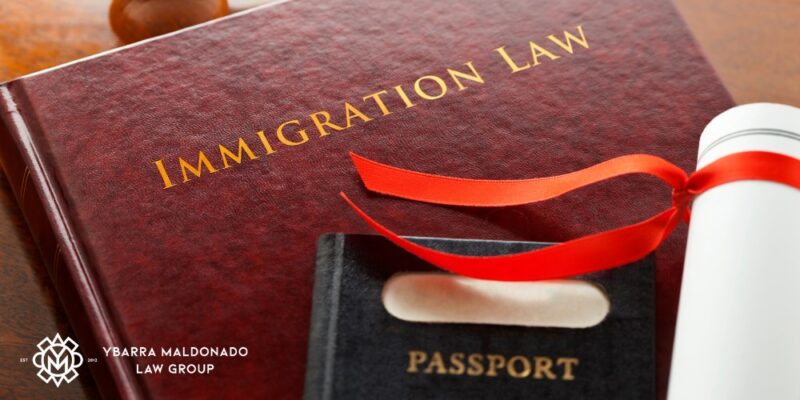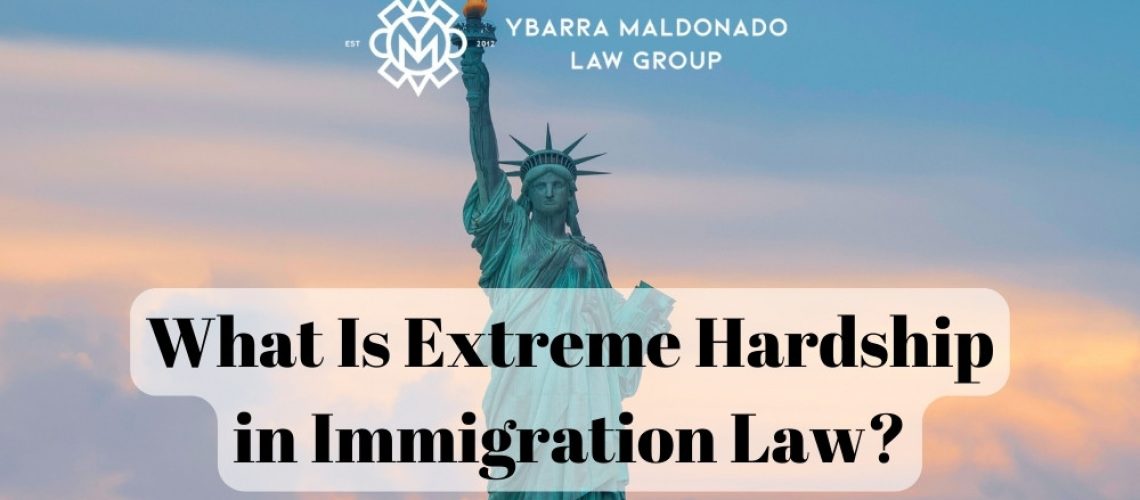Those attempting to get a visa or green card in the United States may encounter the term “inadmissibility” if they meet one of the parameters outlined in U.S. immigration law. If someone is found inadmissible, it means that they cannot get a visa or green card based on criminal violations, health grounds, or past immigration violations. If you or one of your family members has been deemed inadmissible to the United States, you may be able to overcome this obstacle by requesting an extreme hardship waiver.
In this blog, the experienced Phoenix immigration lawyers at Ybarra Maldonado Law Group are here to explain inadmissibility, extreme hardship, and what you can do to apply for a waiver. We have years of experience helping immigrants and their qualifying relatives secure visas and green cards. If you have been deemed inadmissible, you may be able to establish extreme hardship with a waiver to avoid family separation and other obstacles. To schedule a case evaluation with one of our compassionate attorneys, please call our Phoenix office at 602-910-4040 today.
What Makes Someone Inadmissible to the United States?
According to the United States Citizenship and Immigration Services (USCIS), “Individuals who are inadmissible are not permitted by law to enter or remain in the United States.” The federal law that defines what constitutes inadmissibility is the Immigration and Nationality Act. There are eight general categories of inadmissibility, with each encompassing many specific factors.
The eight categories outline grounds of inadmissibility due to:
Health Reasons
- Communicable diseases of public health significance
- Failure to receive necessary vaccinations
- Physical or mental disorders associated with harmful behavior
- Substance abuse
Criminal Reasons
- Crimes involving moral turpitude (CIMTs)
- Violations of controlled substances laws
- Having multiple criminal convictions
- Drug trafficking
- Prostitution or commercialized vice
- Religious freedom violations
- Human trafficking
- Money laundering
- Commissions of serious crimes in which the individual has immunity from prosecution and leaves the United States
National Security Reasons
- Nazi persecutions or genocide participants
- Anyone who is believed to want to enter the United States to participate in espionage, sabotage, unlawful activity, or overthrowing the government
- Anyone who is believed to have participated in terrorist activities or who is associated with terrorist organizations
- Those believed to be a threat to foreign policy
- Members of totalitarian parties
Likelihood of Becoming a Public Charge
A public charge is someone who is primarily dependent on the government. If someone is deemed likely to become a public charge, they may be deemed inadmissible.
Fraud or Willful Misrepresentation
If someone attempts to enter the United States, obtain a visa or other travel document, or obtain any immigration benefit does so by way of fraud or willful misrepresentation of facts may be deemed inadmissible.
Unlawful Presence or Previous Removals
- Anyone who was in the United States unlawfully for a total of one year, then illegally reentered the country
- Those who have previously been removed from the United States
Other Miscellaneous Reasons
- Lack of labor certification
- Entering the country illegally
- Failing to attend immigration or removal hearings
- Unlawful voting
- Smugglers
- Abusers of student visas
- Those who renounce their citizenship to avoid tax consequences
- Practicing polygamy
- Child abductors and relatives of abductors
What Is “Extreme Hardship” in Immigration Cases?

If someone is deemed inadmissible to the United States for one of the above reasons, they may be able to enter the country by filing an extreme hardship waiver. Extreme hardship is defined as hardship that is greater than what someone would experience under normal circumstances if the intended immigrant is not allowed to enter the country.
The argument that family members would experience extreme hardship does not apply to cases where one will simply miss the other. Something more significant must be at play to suffer extreme hardship. There is no specific law that defines extreme hardship vs normal circumstances. However, we can provide an example of a situation that would qualify as extreme hardship for a qualifying relative.
James is an immigrant who lives and works in the United States, also acting as a caretaker for his aging parents. If he were to be found inadmissible for one of the aforementioned reasons, his parents would likely suffer extreme hardship if he were deported. In this case, James could apply for a waiver to prove extreme hardship.
What Is an Extreme Hardship Waiver?
An extreme hardship waiver, also called an I-601 waiver, is an immigration document that one can use to avoid inadmissibility, and therefore deportation or removal. The waiver can generally be used by those who want to obtain a visa, keep their permanent resident status, avoid deportation, and more.
Types of Extreme Hardship Waivers
No immigration law exists that explicitly outlines every type of acceptable hardship waiver. However, the three most common types are those for unlawful presence, fraud or misrepresentation, and crimes involving moral turpitude.
Waivers for Unlawful Presence
If someone is in the United States unlawfully for certain periods of time, they may be found inadmissible, which means they cannot get a visa or green card to enter the country. However, in some circumstances, those deemed inadmissible can file a waiver of their inadmissible status.
In this instance, the individual would file an unlawful presence waiver. This is a form of hardship waiver that allows individuals to bypass their inadmissibility and proceed in the immigration process.
Waivers for Fraud or Misrepresentation
If someone provides fraudulent information or misrepresents facts while taking immigration actions related to visas or green cards, they may be deemed inadmissible. Inadmissibility would bar someone from obtaining a visa or green card through adjustment of status.
A misrepresentation or fraud waiver would allow qualifying relatives to file a hardship waiver. This waiver, if granted, would allow someone to overcome their inadmissible status and continue in the process of immigration.
Waivers for Crimes Involving Moral Turpitude
Crimes involving moral turpitude are those in which the “offense contains criminal intent or recklessness or when the crime is defined as morally reprehensible by the state.” If someone is charged and convicted of one of these crimes, they may be deemed inadmissible.
Under certain circumstances, individuals affected in this way may be able to file a hardship waiver. If granted, the waiver would reinstate their ability to get a green card or immigrant visa. However, they must prove that their qualifying relative would suffer extreme hardship by being separated from them.
Who Can Be Considered a Qualifying Family Member?

To successfully file a hardship waiver, you must show not just extreme hardship, but also have a qualifying relative. Not all family members could be considered qualifying relatives for extreme hardship waivers. Before filing a hardship waiver, we strongly recommend speaking with an experienced immigration lawyer about your case. We can advise you on how to file from start to finish.
Below, we outline who counts as a qualifying relative for each of the three types of waivers.
- Unlawful presence: Qualifying relatives include American citizens or permanent resident parents or spouses. Other family members, such as aunts, uncles, children, siblings, and others are not considered qualifying relatives for this type of waiver.
- Fraud/Misrepresentation: A qualifying relative can be a spouse or parent who is a citizen or permanent resident of the United States. Children, siblings, and other relatives do not qualify.
- Criminal conviction: A qualifying relative could be a parent, child, or spouse who is a citizen or permanent resident of the United States. Siblings and other relatives do not qualify.
What Are the Grounds for Extreme Hardship Waivers?
Firstly, the extreme hardship factors do not apply to you, but to your qualifying relative. The hardship that you might face from the separation is only relevant if it also causes extreme hardship for your relative. This is one of the most common misconceptions and filing mistakes regarding extreme hardship waivers.
No laws exist that explicitly state what is and is not considered extreme hardship. Generally speaking, it is a hardship that is greater than what the qualifying relative would have experienced under normal circumstances if the intending immigrant were not allowed into the country.
Below, we list examples of situations that could qualify for an extreme hardship waiver.
If the Relative Is in the United States and the Immigrant Is Abroad
- The relative has a serious medical condition and relies on the intending immigrant for care.
- The relative financially depends on the immigrant, and they cannot provide enough support from abroad.
- They may suffer significant emotional hardship, such as depression, as a result of the separation.
- The relative has debts in the United States and cannot afford to pay them without support from the immigrant.
- The relative is a child’s caregiver and can’t afford to pay for childcare without the immigrant.
- They cannot care for their sick family member without support from the immigrant.
If the Relative Joins the Immigrant Abroad
- The relative doesn’t know the language of the immigrant’s home country.
- Their home country is currently involved in or on the verge of war or political strife.
- Their country has a reputation for violence.
- The relative would suffer discrimination in the home country.
- The relative has a medical condition that could not be properly treated in the home country.
- Their education would be affected by returning to the home country.
- The relative would not be able to find gainful employment in the home country.
- The relative has debt in the United States that cannot be repaid from the home country.
How to Prove Extreme Hardship
Remember that the above lists are not exhaustive. They are merely examples of what could result in extreme hardship for a qualifying relative. To establish extreme hardship, you’ll need a considerable amount of evidence.
First, collect a statement from the relative that describes the extreme hardships they would face either living in the United States without you or joining you abroad. You should also submit a personal statement that supports the arguments in your qualifying relative’s statement. Focus more on how your separation would affect your relative rather than yourself.
What Evidence Can I Use to Prove Extreme Hardship?

If possible, collect all relevant supporting documents for your arguments. Never send USCIS an original document as evidence. Always make a copy and submit that with your application. Examples of acceptable documents include, but are not limited to the following.
- Tax returns or pay statements to show household income
- Reports from the Department of State, other government agencies, or human rights groups about the difficult conditions of the home country
- Statements showing that debts must be settled in the United States
- Doctors’ letters to show evidence of mental or physical conditions that may cause extreme hardship
- News articles reporting events in the home country that may lead to extreme hardship
- Letters from other friends, relatives, or professionals who can support your argument
Immigration Hardship Letter
Extreme hardship letters are strong pieces of evidence for those filing hardship waivers. They help corroborate your statements and arguments by presenting all relevant evidence as support. Rather than being simple letters, hardship letters are often more akin to packets of information and evidence.
Simply writing a letter explaining the situation and mailing it to USCIS likely won’t be enough to show extreme hardship. However, including organized supporting evidence can greatly strengthen your argument. Working with a skilled immigration attorney can ensure you are as prepared as possible when you file your waiver.
How Does USCIS Decide on Extreme Hardship Waivers?
USCIS considers many factors when deciding whether or not to grant hardship waivers. They consider the totality of circumstances in the applicant’s waiver request, which means they will consider everything that the applicant submits with the request.
They will also consider the potential consequences of denying a hardship waiver. Some of the most common consequences they will consider include the following.
- Family separation or severing family ties
- Difficult readjustment to life in another country
- Economic hardship
- Availability and quality of education in another country
- Ability to obtain employment abroad
- Quality and availability of medical services and facilities
Keep in mind that the presence of potential consequences is not enough for USCIS to approve a waiver. They will consider all factors and consequences of denial in their totality, as well as cumulatively.
Do You Need a Lawyer for an Extreme Hardship Waiver?
If you are an immigrant that is trying to enter into or remain in the United States, but you have been deemed inadmissible, you may benefit from an extreme hardship waiver. While you are not required to hire an attorney for your case, doing so is in your best interest. Proving extreme hardship can be very difficult, even with what feels like a mountain of evidence.
The simple truth is that a trained immigration lawyer will understand what it takes to show that your situation may result in extreme hardship. Immigration laws are very different from, for example, those that govern family law proceedings.
These cases involve federal laws and regulations, which means you need a skilled attorney to help you navigate the complex process.
Contact the Phoenix Immigration Lawyers at Ybarra Maldonado Law Group Today
At Ybarra Maldonado Law Group, our compassionate attorneys are dedicated to serving the immigrant community in Phoenix, AZ. The families we serve often face difficult situations, but we do everything we can to help them obtain favorable outcomes in their cases. If you are an immigrant who fears you or your family will experience extreme hardship if you cannot enter the country, contact our law office as soon as possible. Our immigration law professionals will analyze your case during a case evaluation and advise you on your next steps. To schedule your case evaluation with us, please call our office at 602-910-4040 today.


